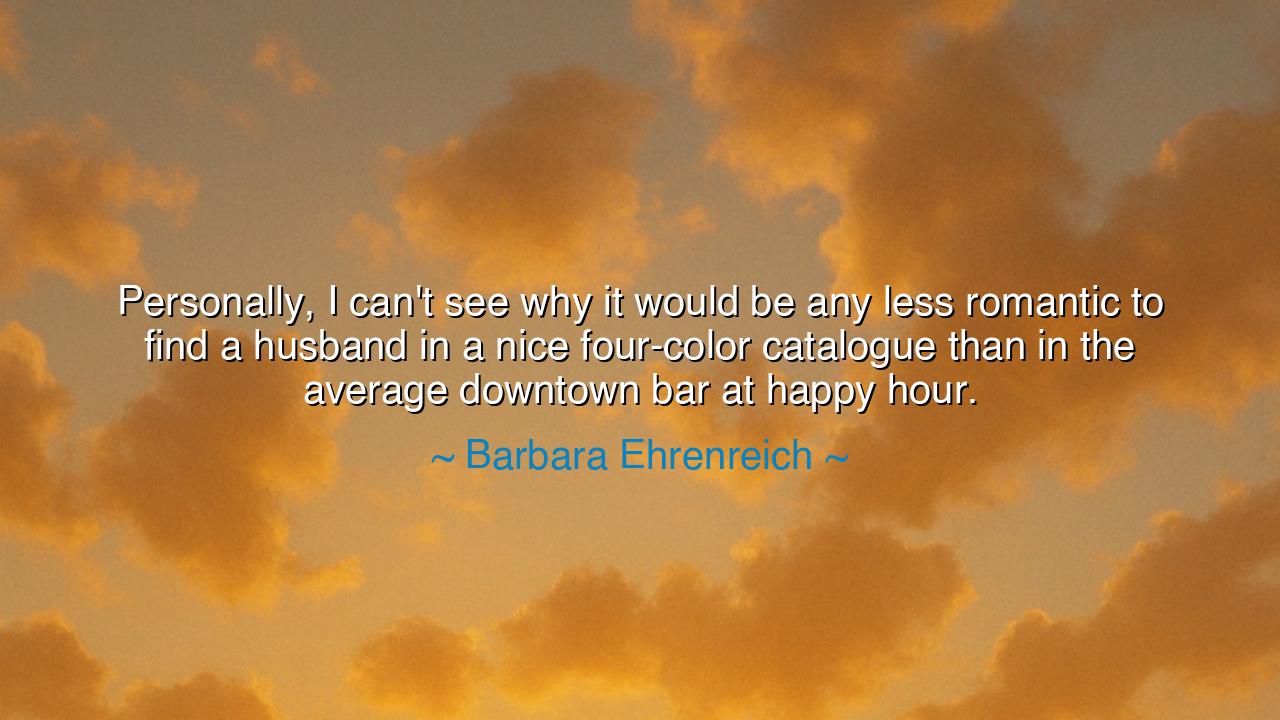
Personally, I can't see why it would be any less romantic to find
Personally, I can't see why it would be any less romantic to find a husband in a nice four-color catalogue than in the average downtown bar at happy hour.






“Personally, I can’t see why it would be any less romantic to find a husband in a nice four-color catalogue than in the average downtown bar at happy hour.” So declares Barbara Ehrenreich, piercing the illusions of society with wit and wisdom. At first her words may seem playful, but beneath them lies a challenge to our assumptions about what makes love “authentic.” She reminds us that romance is not determined by the stage upon which it begins—whether a catalogue or a bar—but by the truth of the connection that follows.
The ancients knew well the folly of judging love by its setting. Did not Paris first see Helen at a banquet, a place of politics and performance? Did not Odysseus win Penelope through contests arranged by her family? These beginnings were hardly the stuff of fairy tales, yet their loves became the foundation of legends. So too does Ehrenreich remind us that love is not sanctified by the place where it starts, but by the depth it achieves once found.
Her mention of a catalogue calls to mind the modern systems by which people seek partners—mail-order matches, dating services, and now digital profiles. Many scoff, declaring such methods mechanical, unromantic. Yet Ehrenreich contrasts this with the so-called traditional meeting in a bar at happy hour—a scene often drenched in noise, drink, and fleeting interest. She asks: what, truly, is more real? A carefully chosen partner through a catalogue, or a chance encounter clouded by distraction?
History offers us guidance. In the days of royal courts, marriages were arranged by contract, sealed by families for alliance and wealth. Were these unions devoid of romance? Not always. The story of Eleanor of Aquitaine and Henry II began as a political match, yet their passion was so fierce it altered the course of kingdoms. Love, once ignited, can grow even from practical beginnings. It is not the manner of meeting but the fire that follows that makes romance eternal.
What Ehrenreich reveals is that romance is a quality of the heart, not of circumstance. It arises not from chandeliers or taverns, not from candlelight or catalogues, but from the honesty and devotion of two souls who find in each other something worth cherishing. To claim one origin more romantic than another is to mistake the surface for the substance, the stage for the play.
The lesson is clear: do not let others dictate the legitimacy of your love based on how it began. A love born online, through introduction, through catalogue, or through barroom glance—all can be equally hollow, or equally profound. What matters is not how the meeting was staged, but whether the souls who met chose to honor the spark, to build upon it with trust, patience, and care.
Therefore, beloved listener, heed Ehrenreich’s wisdom. Do not scorn the humble beginnings of your love story, nor compare it to the romances of others. Instead, measure it by the depth it achieves, by the endurance it proves, by the joy it brings. For the true romance lies not in the setting of the first meeting, but in the journey that unfolds afterward—a journey where honesty, loyalty, and tenderness weave a bond stronger than fate. And in this truth, every origin, whether catalogue or happy hour, can be radiant with love’s eternal light.






AAdministratorAdministrator
Welcome, honored guests. Please leave a comment, we will respond soon